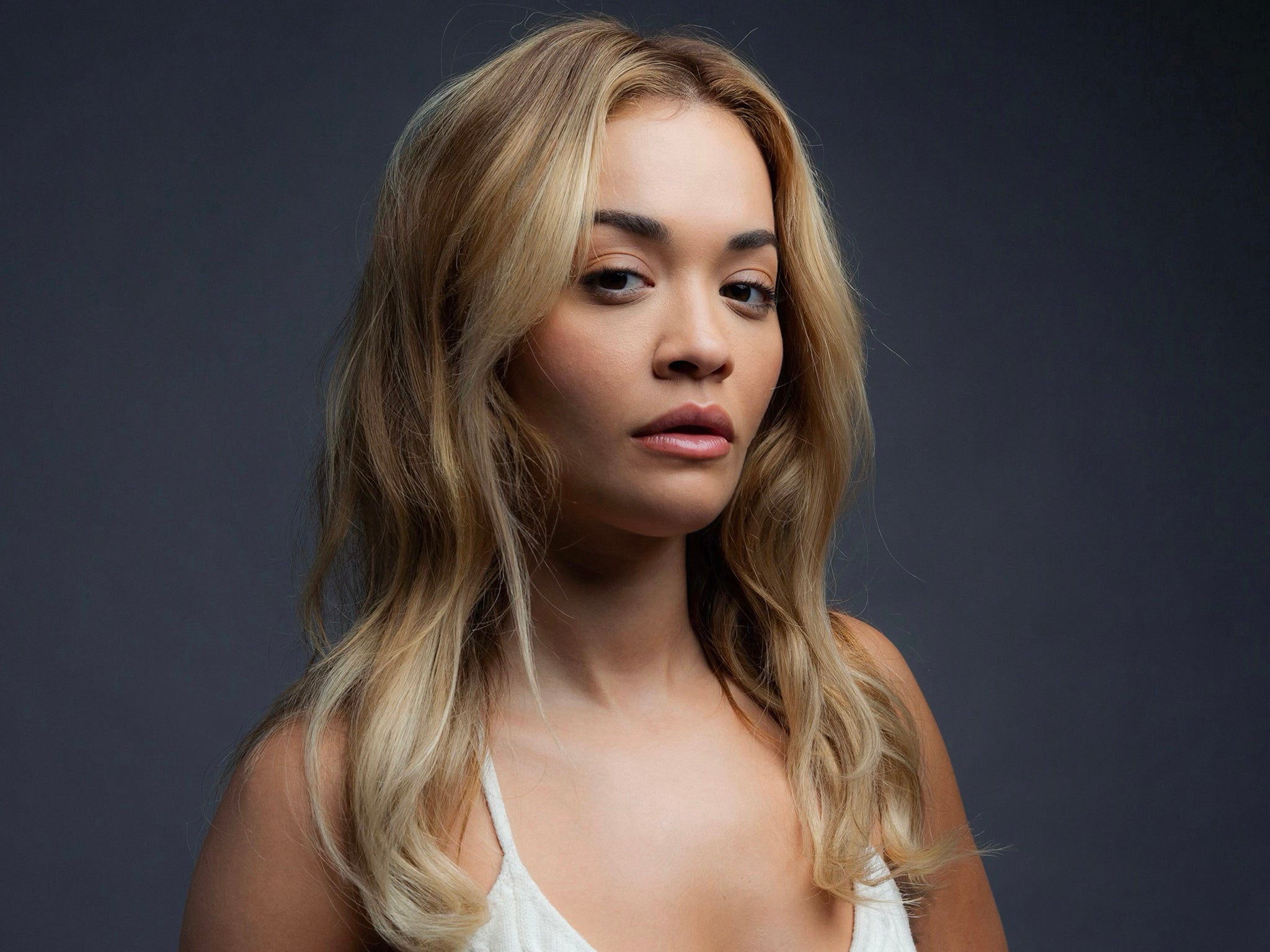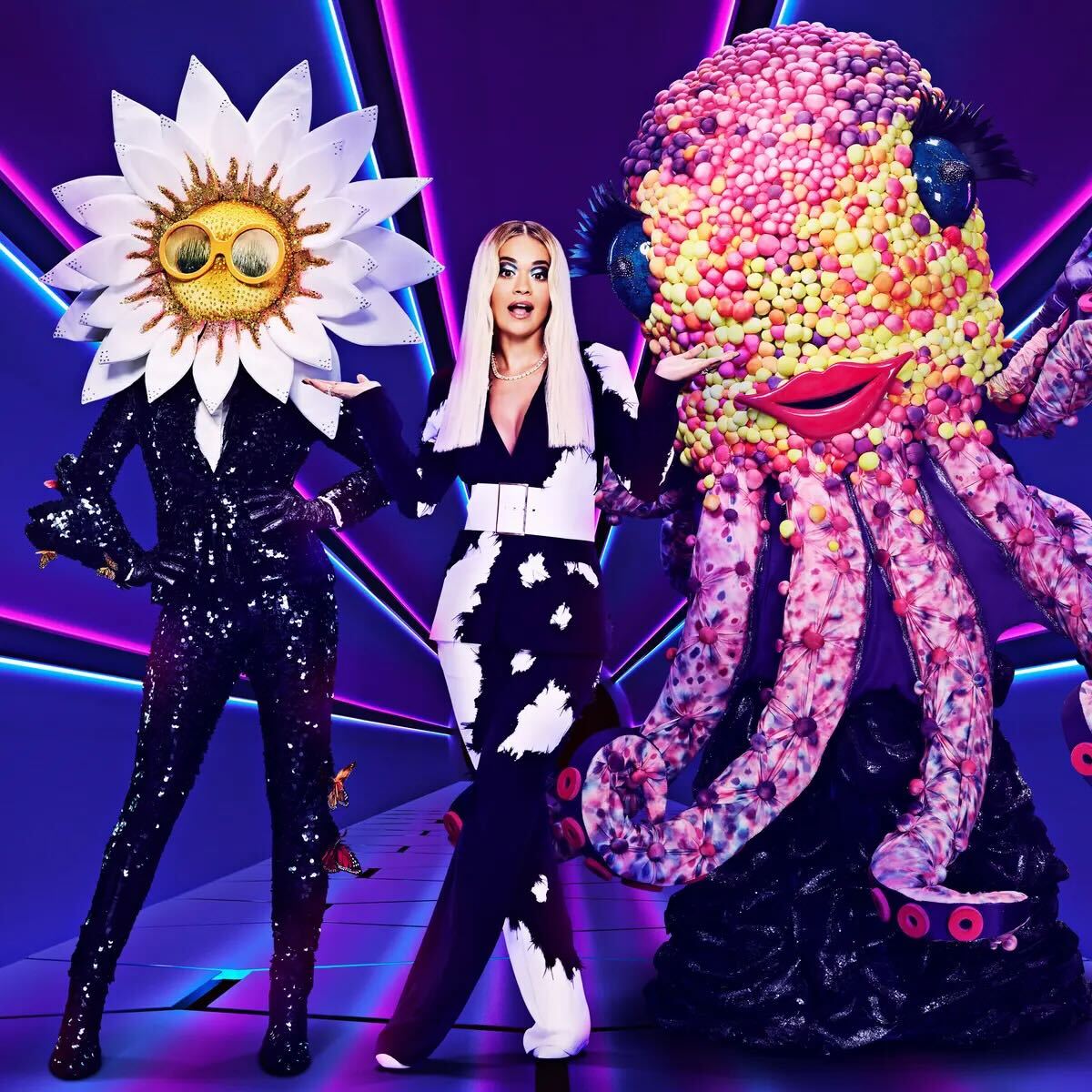Rita Ora: ‘Freezing my eggs was the best thing I ever did’
Exclusive: As the singer returns to the bonkers game show ‘The Masked Singer’ next month, she opens up to Charlotte Cripps about IVF, her relationship with Taika Waititi, and why she will always feel passionate about protecting refugees


Your support helps us to tell the story
From reproductive rights to climate change to Big Tech, The Independent is on the ground when the story is developing. Whether it's investigating the financials of Elon Musk's pro-Trump PAC or producing our latest documentary, 'The A Word', which shines a light on the American women fighting for reproductive rights, we know how important it is to parse out the facts from the messaging.
At such a critical moment in US history, we need reporters on the ground. Your donation allows us to keep sending journalists to speak to both sides of the story.
The Independent is trusted by Americans across the entire political spectrum. And unlike many other quality news outlets, we choose not to lock Americans out of our reporting and analysis with paywalls. We believe quality journalism should be available to everyone, paid for by those who can afford it.
Your support makes all the difference.Rita Ora is standing in her large, open-plan kitchen talking about freezing her eggs. Her mum, Vera, is cooking us baked salmon for supper, while Ora’s sister/manager/business partner Elena, who is often credited as the secret driving force behind Ora’s global fame, sits at the kitchen table playing with her black curly hair. The room smells divine. Diptyque candles flicker from fireplaces.
“Statistically, how many embryos does it take for it to work?” the singer asks me. I hadn’t foreseen becoming the resident IVF expert, but I’ve just told her about my own fertility journey. “I’m just interested,” she presses. Ora froze her eggs aged 24, and then again at 27, when they’re at their best quality, on the advice of her doctor. Her mother doesn’t disapprove, exactly, but it’s something she still struggles to get her head around.
“Why? Why? In Kosovo we just have children,” says Vera, with a thick Kosovan accent, as if conceiving is the easiest thing in the world. “Why spend so much money on having children? I don’t understand?” Ora stands there, unfazed but not saying much.
“I’d love to have a nice big family,” she tells me later, now sat on a huge cream sofa. In Kosovan culture, having children is “what’s important”, she adds. “And I think as women, we put that pressure on ourselves, subconsciously, because we feel like that is our duty – to create and give life. So, I just wanted to not worry about it. And I didn’t after, and it was the best thing I ever did.”
With the eggs on ice, having children hasn’t necessarily been top of Ora’s immediate to-do list of late. She’s an all-round entertainer – a singer, actor, model, TV personality and entrepreneur – and is the British female artist with the most UK Top 10 singles in chart history. Ever since she was featured on DJ Fresh’s 2012 No 1 hit “Hot Right Now” aged 22, she’s racked up 13 in total, including “Your Song”, co-written with Ed Sheeran, and the Drake-penned “RIP” with Tinie Tempah. And on New Year’s Day, amid putting the finishing touches to new music, she returns as a judge on ITV’s The Masked Singer.
In case you haven’t yet experienced this televisual fever dream, it’s a wacky reality game show in which celebrities put on ludicrous, identity-concealing costumes and sing for a panel that comprises Ora, Jonathan Ross, Davina McCall and Mo Gilligan. It’s the judges’ job not just to critique the performances, but to answer the question – as the catchy jingle goes – “Who’s that behind the mask?” Last season, Joss Stone won it dressed as a sausage.
“It’s as crazy as it looks on TV,” says Ora. “It’s insane.” The new third series will include a bagpipe, a traffic cone, a robobunny and a stack of doughnuts. “I can’t even tell you what just happened to me on this last filming that we just did,” she says with a laugh. “It was honestly the most jaw-dropping thing I have experienced.” She is supremely entertaining on the show. Though acting might not be her strongest suit – she played Christian’s sister in the pilloried Fifty Shades of Grey films, and the Artful Dodger in Twist, a painful modern version of the Dickens classic – she is good at being herself onscreen: playful, quick, unselfconscious. No doubt Ora, who put forward Alan Partridge and Austin Powers as potential contestants in series two, will again have some bizarre guesses. Mind you, she did have a 38 per cent accuracy rate last season – far higher than the others. “But you know, sometimes, I’m like, ‘Who the f*** is that?’”
In person, Ora is so luminous, she looks like the embodiment of a Touche Eclat pen. Dressed in plain jeans and an open-neck shirt, she’s warm and unguarded; beneath that public mask she seems far less brassy and tough. She shows me round her north London mansion, a listed building complete with a blue plaque. From the outside, it looks like something out of Hammer House of Horror – but the inside has been freshly renovated. Ora leads me into the living room, then a snug room, which is lavishly furnished and has nick-nacks from the Portobello Road market near to where she grew up. Her Damien Hirst “butterfly circle painting”, a gift from the artist that “got dropped” in transit, hangs on the wall despite the slightly smashed frame.
Ora’s only just moved in. She’s spent the best part of this year in LA recording her forthcoming third album, and in Sydney filming The Voice Australia, where she met her boyfriend, 46-year-old New Zealand film director Taika Waititi. “It’s the first time I’ve really let anybody into my house that I’ve never met before,” she says. It’s also the first time she’s broached the subject of breaking UK Covid lockdown.

Watch Apple TV+ free for 7 days
New subscribers only. £8.99/mo. after free trial. Plan auto-renews until cancelled

Watch Apple TV+ free for 7 days
New subscribers only. £8.99/mo. after free trial. Plan auto-renews until cancelled
Last November, when households were banned from mixing indoors, she attended a “spur-of-the-moment” private party to celebrate her 30th birthday at restaurant Casa Cruz (which was not only paid £5,000 to reopen for the night, but also asked to turn off its CCTV cameras, according to police) in west London’s Notting Hill. It was branded by police “one of the most egregious and notorious” breaches of lockdown; Ora had returned from a work trip in Egypt and was supposed to be self-isolating for 14 days. On social media, she called it “a serious and inexcusable error of judgement”. Is it a big regret?

“I am incredibly embarrassed,” she says. “I still feel embarrassed. And the regret...” Her eyes well up. “It’s really hard for me to talk about it. I just wish I had made a different choice. It makes me sad because it’s something I wish had never happened.” She understands the reaction. “People were making huge sacrifices at the time, and I let them down. And that hurts. It really hurts.”
Ora’s mum, a psychiatrist for the NHS, suddenly appears in front of us with two plates of food. She’s clearly concerned about her daughter’s celebrity, and the scrutiny she comes under. “I don’t enjoy Rita’s fame,” she says. “I worry about what she’s eating. Is her tummy hurting? Does she have a temperature?”
She’s right to worry. Ora so overworked herself in 2013 that she was stretchered into an ambulance in Miami with “exhaustion right at its highest level”, she tells me. She works too hard, she says, because she comes “from nothing”. Her middle-class Albanian family fled Kosovo in 1991, when Albanians were being persecuted under the leadership of Slobodan Milosevic, who was later charged with war crimes and genocide. The family sought safety and refuge in the UK when Ora was one, and lived four to a room in Earl’s Court before moving to less cramped council accommodation, a stone’s throw from Grenfell Tower.
I will endlessly feel passionate about refugees because I am one. I’m very proud of being one. And I think there’s often this stigma around refugees. A stigma that I really am making it my mission to break
“Sometimes it’s hard to explain how it is to be a refugee to non-refugees, because it’s not about a sympathy vote,” says Ora. “It’s not about feeling sorry for us. It’s more about an opportunity vote. I don’t know if I would be here in this dream house if it wasn’t for moving to the UK. And where I’d be if I hadn’t been given that opportunity.”
The UK’s attitude towards refugees hasn’t much improved since Ora’s family arrived 30 years ago; just a few weeks after we talk, 27 refugees will drown in the Channel trying to reach Britain, and the government will respond by promising tougher measures rather than safe passage. “My parents came to the UK for us – so we could be raised in a safer environment,” says Ora, who is a Unicef UK ambassador, focusing on their refugee work. “And for the rest of my life, I will endlessly feel passionate about refugees because I am one, and I will always be one. I’m very proud of being one. And I think there’s often this stigma around refugees. A stigma that I really am making it my mission to break.”
Ora has always aimed to provide for her family “as they have for us”, she says, and “to create a better life for me and them”. Vera and Ora’s dad Besnik, a pub owner in Kilburn, scraped together the money to send her to the private Sylvia Young Theatre School. She comes from showbiz stock: her paternal grandfather, Besim Sahatçiu, was an award-winning Kosovan-Albanian director of theatre and film. She was named Rita after Rita Hayworth, one of Besnik’s favourite actresses.
“I said endlessly to my parents growing up, ‘I want to be a singer’, ‘I want to do music’, ‘I want to be an entertainer,’” says Ora, who left school at 16. “I don’t think they ever thought it’d be a career for me.” She worked in a shoe shop on the Portobello Road, earning £80 a week, lived at home, and was an intern at a recording studio in Ladbroke Grove, where she managed to get her voice on a demo. It happened to be Craig David’s “Where’s Your Love”, released in 2008.

A year later, she turned down the chance to represent the UK at Eurovision, partly because her mum felt that it would be the death knell for her nascent career. Instead, Jay-Z’s Roc Nation label signed her, clearly impressed by her radio-friendly pop music, and she released her UK No 1 debut album Ora in 2012. A few years later, though, she filed a lawsuit to get out of her contract, claiming she had completed new music for her second album, but the label hadn’t released it. She accused them of neglecting her in favour of other artists; the label counter-sued and then settled out of court in 2016.
“I was put in unfortunate circumstances where my specific vision just didn’t match theirs,” Ora says about that time. She signed to Atlantic Records in 2016, and six years after her debut album, released its follow-up, the aptly named Phoenix. It spawned her biggest hits to date: “Your Song”, “Anywhere”, and “Let You Love Me”. “I’m just happy I didn’t give up on that vision,” she says. “When [Roc Nation] didn’t understand the Phoenix record, I just was really confused, because I was like, ‘I’ve given everything.’ So, I just simply went to people that did understand it.”
There are other times when she’s had to fight to be taken seriously. She recalls feeling “completely belittled and discouraged” when she first started, and remembers one incident when, aged 16, she played her demos to a music exec. “I won’t say his name because he’s actually still very influential in the industry today,” she explains, “but I had a meeting with him and he said, ‘I don’t like any of these songs.’ He took me to the CD store, threw down his credit card, said, ‘Get anything you want – go get inspired,’ and walked out. And I don’t know why he didn’t want his card back?” She laughs. “But that got me really frustrated. And that just made me determined to go and work more. And, you know, I’m thankful to that person.”
These days, her biggest battle is with the relentless media scrutiny. It’s hard to reconcile the Ora I’m speaking to today with the one splashed across the tabloids: Ora in bikinis and on private jets, suffering a very messy public split with Roc Nation, or falling out with A-list exes – including Calvin Harris, who reportedly prevented her from releasing music they wrote together and from performing her hit single “I Will Never Let You Down”.
And then there’s the Ora who was criticised by some in the LGBT+ community for a “tone-deaf” approach to same-sex relationships in her 2018 sapphic song “Girls”, in response to which she revealed she has “had relationships with both men and women”. Or, more recently, the backlash when paparazzi pictures emerged of Ora supposedly in a three-way kiss with Waititi and actor Tessa Thompson on the balcony of the director’s Bondi beach home. Waititi was reportedly “reprimanded” by Marvel bosses for projecting the wrong image for the franchise. He responded by saying: “I was doing nothing wrong.”

Ora remains tight-lipped about this particular relationship, except to say: “I didn’t expect to find love in Australia, nor was I looking for it.” She’s keen to keep it out of the spotlight and “protect it”, she says. Has she changed the way she’s dating in the public eye? “Yes, definitely. I think protecting something that you really care about, you’ve got to have a sense of privacy a little bit. I wouldn’t have known that if I didn’t go through what I went through in the past.” Such as? “Just, you know, being so trusting and sometimes oversharing. It’s OK to be a bit more reserved with things that you find private and want to protect.”
If the mistake of breaking Covid rules paints a picture of a pop star who thinks she’s untouchable, behind the headlines Ora suffers from panic attacks and anxiety. Even now, her breathing becomes shallower when we touch on sensitive topics. The difference is: she’s learnt how to deal with it. She’s been in therapy since the age of 17.
“I still go to therapy,” says Ora. “I had my therapist on the phone with me today, at midday. We were talking for an hour. I don’t know how I could function without therapy.” It’s a topic she’s included in the lyrics to a new song she’s been recording recently. She recites it for me. “You can’t move forward without learning how to forgive/ I went through therapy…” She stops and starts to hum the melody to remember the line. “I went through therapy to learn how to heal...”
The panic attacks and anxiety started in 2005, when Ora – then 15 – was given the news that her mum had breast cancer. “I was helpless. I felt like, ‘Well, what am I gonna do without my mum?’ I couldn’t fathom a world without her. It was a very confusing time for us because she was always there to be our rock and our anchor… And I think as kids, you always feel like your parents are like superheroes, you know? They never break. And when they do break, you’re like, ‘Why are you breaking?’”
Ora thought she had breathing problems at first. “I went to the doctors. I was like, ‘I think I have asthma.’ I didn’t realise it was a panic attack. I think the word ‘panic attack’ freaked me out.” Her mum overcame the cancer – it had been caught early – and Ora tries to channel her anxiety now into excitement or “encouraging emotion – because it’s energy, isn’t it?”
It’s time for me to leave. As Ora walks me out, she points out the black crystal hanging from her front door. It’s for “positive energy”, she says – though that doesn’t mean saying yes to everything. “Coming from nothing, I don’t want to say ‘no’ to anything.” She smiles. “But you have to pick your battles.”
‘The Masked Singer’ returns to ITV on 1 January 2022



Join our commenting forum
Join thought-provoking conversations, follow other Independent readers and see their replies
Comments